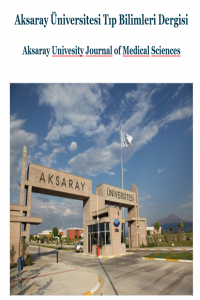Tip 2 Diyabetik Hastalarda Glisemik Kontrolün D Vitamini, B12 Vitamini ve Lipid Profili Üzerini Etkilerinin Araştırılması: Bir Retrospektif çalışma
Amaç: Tip 2 diyabet hızla büyüyen bir halk sağlığı sorunudur. Türkiye'de tip 2 diyabet hastalarında oral antidiyabetik kullanımının D vitamini, B12 vitamini ve lipid profili üzerine etkisi hakkında sınırlı veri bulunmaktadır. Bu nedenle, bu çalışmada tip 2 diabetes mellituslu hastalarda glisemik kontrolün D vitamini, B12 vitamini ve lipid profili üzerindeki etkisini belirlemek amaçlanmıştır.
Yöntemler: 2020 ve 2021 yılları arasında Aksaray Üniversitesi Tıp Fakültesi Araştırma Hastanesinde İç Hastalıkları kliniğinde tedavi edilen 470 tip 2 diyabet hastasının tıbbi kayıtlarının retrospektif bir incelemesi yapılmıştır. Çalışmaya dahil edilen hastalar hemoglobin A1c (HbA1c) düzeylerine göre üç gruba ayrılmıştır; Grup 1 ( HbA1c değeri %7’nin altında olan hastalar), Grup 2 (HbA1c değeri %7-9 arasında olan hastalar) ve Grup 3 (HbA1c değeri %9’ dan büyük olan hastalar).
Bulgular: Grup 1’in açlık kan glukoz düzeyinin, diğer iki gruptan anlamlı derecede düşük olduğu (p=0.000, p=0.000), Vitamin D (p=0.000, p=0.000) ve HDL (p=0.018, p=0.005) düzeylerinin ise anlamlı derecede yüksek olduğu belirlenmiştir. Grup 1’in trigliserit düzeyi Grup 3’e göre anlamlı düşük çıkarken (p=0.000), Grup 2’ye kıyasla anlamlı bir fark bulunmamıştır (p=0.339). Grup 2’nin açlık kan glukoz ve trigliserit düzeyleri, Grup 3’e göre düşük dolduğu bulunmuştur (p=0.000, p=0.005). Vitamin B12, kolesterol ve LDL düzeyleri açısından gruplar arasında anlamlı bir fark bulunamamıştır.
Sonuç: Sonuç olarak bu çalışmada elde edilen veriler, diyabetik hastalarda başarılı glisemik kontrolün, vitamin D, HDL ve trigliserid düzeylerini olumlu yönde etkileyebileceğini düşündürmektedir.
Investigation of the Effects of Glycemic Control on Vitamin D, Vitamin B12 and Lipid Profile in Type 2 Diabetic Patients: A Retrospective Study
Aim: Type 2 diabetes is a rapidly growing public health problem. There is limited data on the effect of oral antidiabetic use on vitamin D, vitamin B12, and lipid profile in patients with type 2 diabetes patients in Turkey. Therefore, in this study, it was aimed to determine the effect of glycemic control on vitamin D, vitamin B12 and lipid profile in patients with type 2 diabetes mellitus.
Method: A retrospective review of the medical records of 470 type 2 diabetes patients treated in the Internal Medicine Clinic of Aksaray University Medical Faculty Research Hospital between 2020 and 2021 was conducted. The patients included in the study were divided into three groups according to their Hemoglobin A1c (HbA1c) levels; Group 1 (patients with HbA1c less than 7%), Group 2 (patients with HbA1c between 7-9%) and Group 3 (patients with HbA1c greater than 9%).
Results: The fasting blood glucose level of group 1 was significantly lower than the other two groups (p=0.000, p=0.000), while the levels of Vitamin D (p=0.000, p=0.000) and HDL (p=0.018, p=0.005) were was found to be significantly higher. While the triglyceride level of Group 1 was significantly lower than Group 3 (p=0.000), there was no significant difference compared to Group 2 (p=0.339). Fasting blood glucose and triglyceride levels of Group 2 were found to be lower than Group 3 (p=0.000, p=0.005). There was no significant difference between the groups in terms of vitamin B12, cholesterol and LDL levels.
Conclusion: In conclusion, the data obtained in this study suggest that successful glycemic control in diabetic patients may positively affect vitamin D, HDL, and triglyceride levels.
___
- 1. Biadgo B, Abebe M. Type 2 diabetes mellitus and its association with the risk of pancreatic carcinogenesis: A review. Korean J Gastroenterol. 2016;67(4):168-77.
- 2. American Diabetes Association. Diagnosis and classification of diabetes mellitus. Diabetes Care. 2011;34 1(1):S62-9.
